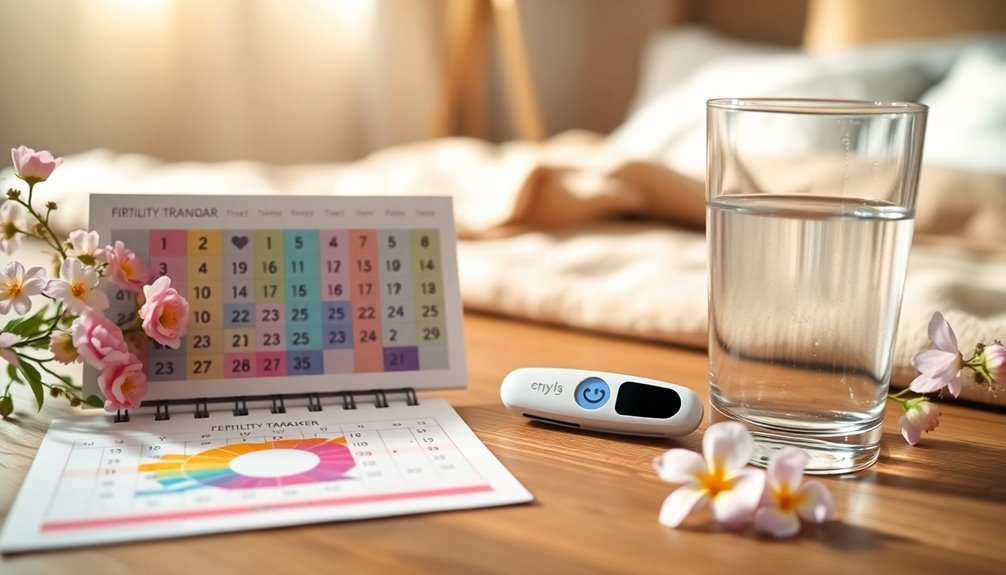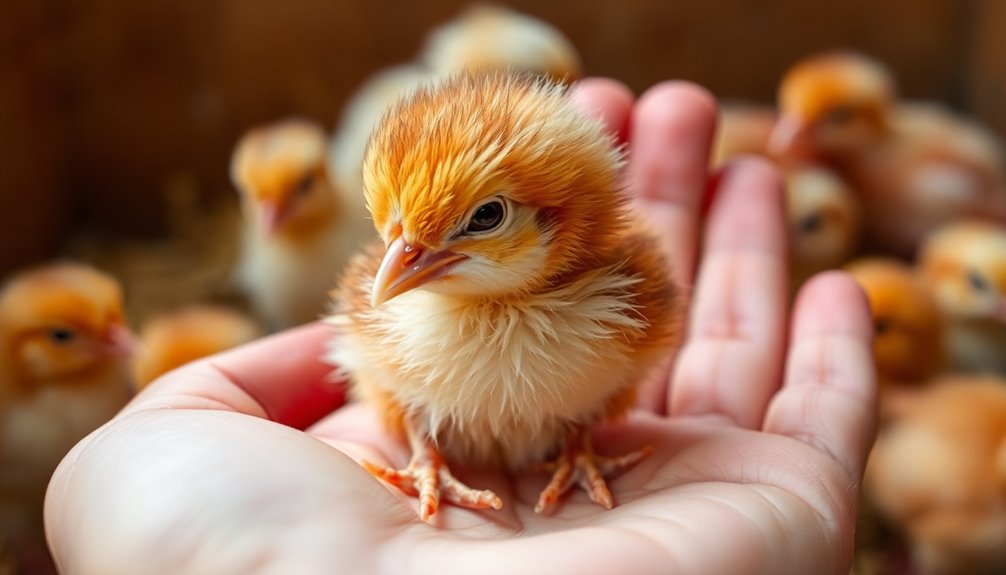You can get pregnant without sex using methods like artificial insemination or IVF. These techniques involve placing sperm directly into your reproductive tract, greatly increasing your chances of conception. Timing is vital, so tracking your ovulation can help you identify the best moments for insemination. Keep in mind that small amounts of sperm in pre-ejaculatory fluid can also lead to pregnancy, but it's less reliable. Understanding these options and managing your fertility can open up new pathways to parenthood. If you keep exploring, you might discover even more methods and resources to support your journey.
Key Takeaways
- Consider artificial insemination or IUI, which directly deposit sperm into the reproductive tract, increasing chances of conception without intercourse.
- Track ovulation using methods like basal body temperature or ovulation predictor kits to identify the fertile window for optimal timing.
- Understand that pre-ejaculatory fluid may contain viable sperm, allowing for non-penetrative methods to potentially result in pregnancy.
- Explore assisted reproductive technologies such as IVF or ICSI, which can help when natural conception is difficult.
- Access resources from fertility clinics and educational platforms to guide you through the process of non-sexual conception.
Understanding Non-Intercourse Conception

How can you achieve pregnancy without having intercourse? You can explore options like artificial insemination or intrauterine insemination (IUI), which involve placing sperm directly into your reproductive tract.
Timing is essential; sperm can survive for up to five days, so tracking your ovulation cycle can boost your chances of conception.
Curiously, pre-ejaculatory fluid can contain viable sperm, meaning non-penetrative methods, like manual stimulation, might lead to pregnancy, although this is less common.
Research shows that about 0.8% of women have reported pregnancies without vaginal intercourse, emphasizing the possibility of "virgin pregnancies."
Understanding fertility and your ovulation window is key to maneuvering these alternative pathways to achieve pregnancy successfully.
Methods of Assisted Reproductive Technologies

Assisted Reproductive Technologies (ART) offer a range of options for those looking to conceive without traditional intercourse.
One popular method is Intrauterine Insemination (IUI), where sperm is directly deposited into your uterus, increasing the chances of conception.
If you prefer a more advanced option, In Vitro Fertilization (IVF) involves fertilizing eggs with sperm in a lab before transferring embryos to your uterus.
For male infertility, Intracytoplasmic Sperm Injection (ICSI) can be used to inject a single sperm into an egg.
Alternatively, home insemination allows you to insert sperm into your cervix using a syringe, often utilizing donor sperm.
Whichever method you choose, fertility tracking and timing with ovulation are essential for maximizing your chances of success.
Timing and Ovulation Factors

Timing your attempts to conceive is essential when you're exploring ways to get pregnant without sex. Understanding your menstrual cycle helps you pinpoint ovulation, which usually occurs 12 to 16 days before your next period.
The fertile window, spanning five days before ovulation to the day of ovulation, is significant for increasing your chances of conception. Sperm can survive in the female reproductive tract for up to five days, making timing critical.
You can use ovulation predictor kits to accurately identify your most fertile days, enhancing the success of methods like artificial insemination. Additionally, tracking your basal body temperature can indicate ovulation.
For those with vaginismus, non-penetrative methods can still lead to successful conception when timing is properly managed.
Common Misconceptions About Pregnancy

Understanding your menstrual cycle and ovulation can help you navigate misconceptions about pregnancy. Many believe you can't get pregnant without vaginal intercourse, but sperm can lead to conception through pre-ejaculate or if ejaculation occurs near the vaginal opening.
It's important to know that pre-ejaculate fluid can contain viable sperm, making the withdrawal method an unreliable contraceptive.
Another myth is that non-penetrative activities or sitting on a toilet seat can cause pregnancy; sperm can't survive long outside the body.
Plus, while breastfeeding often delays ovulation, it doesn't guarantee you won't get pregnant.
Recognizing these misconceptions can empower you on your journey toward understanding your fertility and pregnancy options.
Resources for Support and Guidance

Whether you're exploring alternative methods of conception or seeking emotional support, numerous resources can guide you through the process.
Fertility clinics provide specialized services to discuss insemination options and help with tracking ovulation.
Educational resources from organizations like Planned Parenthood and the Mayo Clinic offer detailed information on reproductive health and non-traditional conception methods.
Additionally, mobile apps like Flo and Clue can assist you in tracking menstrual cycles and optimizing your timing for conception attempts.
For emotional support, consider professional counseling services tailored for individuals or couples handling the psychological aspects of non-sexual conception.
Online communities and forums, such as BabyCenter, also provide valuable shared experiences that can help you feel connected and informed throughout your journey.
Frequently Asked Questions
What Are the Different Ways of Getting Pregnant?
When you're exploring ways of getting pregnant, several methods come into play.
You might consider artificial insemination, where sperm's directly inserted into the uterus.
In vitro fertilization (IVF) allows for egg fertilization outside the body, and you can have embryos transferred afterward.
Home insemination using syringes is another option.
Additionally, intrauterine insemination (IUI) and sperm donation can help you achieve your goal of conception, depending on your preferences and circumstances.
What Is Splash Pregnancy?
You might think splash pregnancy sounds like a fun water game, but it's a serious matter.
This term refers to the potential for conception occurring when sperm is deposited near the vaginal opening, either accidentally or intentionally.
Even pre-ejaculate fluid can carry viable sperm, increasing the risk.
Since sperm can survive for up to five days in the reproductive tract, timing during the fertile window becomes essential for this unique conception possibility.
Can I Still Get Pregnant if I Pee Out the Sperm?
Yes, you can still get pregnant even if you pee out some sperm.
Sperm can survive for up to five days in your reproductive tract, and if any remains after urination, it might still reach the cervix during ovulation.
Plus, pre-ejaculate fluid can contain viable sperm, so there's a risk of pregnancy even without ejaculation.
If sperm contacts your vaginal area, it could lead to fertilization, so it's crucial to be aware of this possibility.
Conclusion
In conclusion, seeking solutions to conceive without conventional coitus can be both exciting and empowering. By exploring innovative methods, understanding your ovulation, and dispelling misconceptions, you're taking significant steps toward your goal. Remember, patience and persistence pave the path to parenthood. Surround yourself with supportive resources and knowledgeable experts to guide your journey. Embrace this extraordinary experience, and you just might find that the road to reproduction offers unexpected joys and discoveries along the way!










